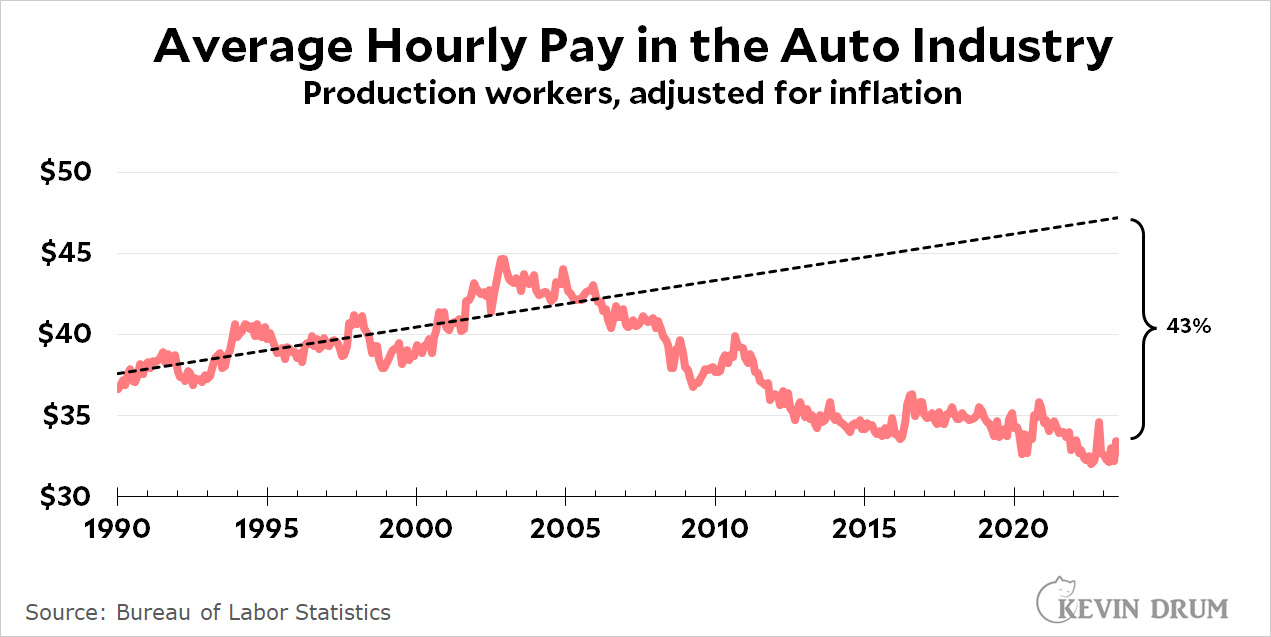As of midnight, the UAW are striking against Ford, Chrysler, and GM, the first time in history the union has struck all three at once. The union is seeking a 40% raise over the next four years, the return of traditional pension programs and retiree healthcare which were eliminated for new hires in 2007, a four-day work week, and a plan for workers who make parts for gasoline cars to transition to working on electrics, among other things.
The part I like is having a plan to train workers to build the new EVs. I’ve never worked in manufacturing but imagine it best to pay employees for that training. I know what i wrote is idealistic of course.
I think they worry that the company could try to use switching to EVs as a way to ditch the old (better-paid) gas-car workers.
The reports I keep hearing is that this is a “historic” event. I’m not sure why. There have been many previous UAW strikes. Anyone know what’s historic about it?
I believe it’s in reference to “the first time in history the union has struck all three at once”.
Correct. The usual tactic has been to hamstring one until it capitulates, then use that agreement as leverage against the others.
My opinion about the strike.
It was a handful of years ago that the American taxpayer bailed out the auto industry. I hear the companies are back to making record profits. If that’s the case, then the employees should share in that.
Electric vehicles are simpler mechanically than ICE ones. The engines are simpler, lacking transmissions, cylinder heads and combustion chambers. So fewer workers are needed to assemble the electric motors and they’ll need different skills.
Tesla makes 41.6 cars per worker. Couldn’t find Ford or GM, but VW is at 28.
Tesla is just about the only car maker making a reasonable profit on EVs. Ford is losing about $790 per EV sold.
The automakers were counting on the eventual lower manufacturing cost of EVs because they require fewer assembly steps and fewer workers. So if the UAW gets job guarantees, how are these companies supposed to compete with Tesla? Especially after they get those large raises?
Honestly confused about this. Joe Biden demands that the EV transition happen, and that it must be done with American companies. These strikes would seem to put all that at risk, yet he fully supports them and is helping them extract maximum concessions from the auto companies.
What am I missing? Labor makes up 15-25% of the cost of a car. On a $50,000 EV, that could be $10,000. If labor costs go up 50% (35% raise plus increased benefits - probably a low estimate), that will add $5,000 to the price of cars from the big 3 automakers, who are already at a large disadvantage because of legacy pension and healthcare costs compared to newer automakers.
This seems likely to delay the transition to EVs, or stall it out completely. That and higher interest rates due to inflation from all the spending going on.
Biden hates Musk and Tesla, but these actions are bound to strengthen Tesla against the competition.
Or it could not do that.
How would you avoid that?
Lower profits, fewer stock buybacks, less executive waste.
Try $60,000:
Ford makes it easy because they put all their EV sales into a separate division (Ford Model e). Their EBIT margin is -102%.
Big 3 needs to fix a lot more than labor to be profitable with their EV offerings. Though the labor doesn’t help.
The automakers have a big EV problem. They can’t make them cheap enough for the mass market. There was a $5 billion consortium to create a $25K EV, and it just failed.
Historically, about 25% of new cars were $25,000 or under. The average price of an EV is about double that, and the cheapest EVs are just under $30,000 for base models. And the automakers apparently do not know how to lower prices. As it is, they are losing money on every EV sold - except for Tesla…
“Under $25,000” may be true historically but I don’t think that’s the case today. I think in the US very few new cars are priced to sell under that and the average price of a new car is well above that.
That’s true today. There’s been a collapse in sales of under-$25,000 cars since the pandemic.
Maybe inflation and supply chain issues have pushed the normally under-$25,000 cars over $25,000, or maybe poorer folks just can’t afford cars at all now. Inflation and housing prices and high interest rates may be killing the bottom of the car market. That would also explain why used cars are holding their value better these days.
None of those explanations bode well for sales of >$35,000 EVs.
To bring this back on subject, substantially higher labor costs among unionized automakers is going to make this an even bigger problem for the big three, making the cost gap between them and Tesla worse. I don’t see how they survive in a world where they can’t sell ICE cars.
Thus there are tentative deals with all three of the traditional unionized US manufacturers. [The union announced its first deal, with Ford, this past Wednesday, and then announced a deal with Stellantis on Saturday night.]
